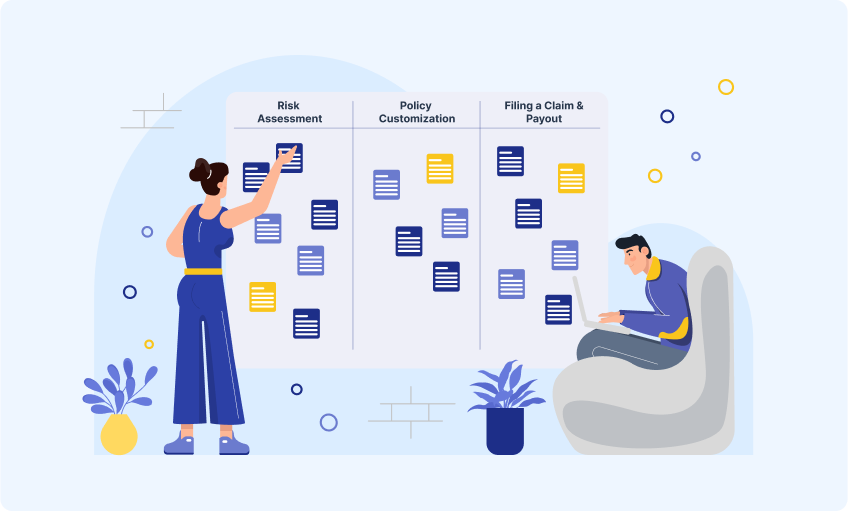Published - a year ago | 8 min read
IT Insurance: Comprehensive Guide to Coverage, Benefits, and Necessity in 2024
IT enterprises represent one of the key sectors of the modern world, which is tightly interconnected and interdependent in its activity with numerous fields of business. However, as organizations depend more on technology, the risks concerning IT services also rise. This is where IT insurance comes into play, providing the much-needed cover against the financial implications of cyber threats, data leaks, system breakdowns, and other related IT risks. It is good for the IT consultant, a software developer, or a large IT firm to know the importance of IT insurance.
Here, we will present a detailed description of IT insurance, its types, and the importance of having insurance for your company in 2024.
Here, we will present a detailed description of IT insurance, its types, and the importance of having insurance for your company in 2024.
What is IT Insurance?
IT insurance is a specific type of insurance that deals with business risks associated with technology and technology solutions. These risks may include:
Cyberattacks: As with ransomware or malware attacks.
Data breaches: Theft or loss of valuable client or business data to third parties without permission.
System failures: Loss of time due to hardware or software crashes and related problems.
Human errors: Errors that may cause a company to suffer setbacks like service hitches or loss-making clients.
IT insurance is different from conventional insurance policies that cover tangible property since it deals with the risks provided by information technology systems.
Cyberattacks: As with ransomware or malware attacks.
Data breaches: Theft or loss of valuable client or business data to third parties without permission.
System failures: Loss of time due to hardware or software crashes and related problems.
Human errors: Errors that may cause a company to suffer setbacks like service hitches or loss-making clients.
IT insurance is different from conventional insurance policies that cover tangible property since it deals with the risks provided by information technology systems.
Why Do IT Businesses Need Insurance?
Just like any other insurance, IT insurance offers a cushion against the various risks that affect the operations of IT companies, such as:
Financial Losses: This implies that a business that experiences any form of service downtime can lose a lot of money if it relies on real-time data or operates online 24/7.
Legal Liabilities: Laws allow clients to seek legal action when they suffer financial loss due to IT service provision or when contractual obligations are not fulfilled, meaning that legal charges can be prohibitive without insurance.
Cybersecurity Risks: Given the escalating trends in cyber threats and attacks, any enterprise that processes, stores, or handles personal information or other sensitive data is vulnerable to cyber threats like data theft, ransomware attacks, or hacking attempts.
Regulatory Compliance: GDPR and CCPA are some of the strict laws that protect data; a data breach can lead to fines. IT insurance assists companies in fulfilling their legal requirements after a breach by providing legal expenses and notifications.
Financial Losses: This implies that a business that experiences any form of service downtime can lose a lot of money if it relies on real-time data or operates online 24/7.
Legal Liabilities: Laws allow clients to seek legal action when they suffer financial loss due to IT service provision or when contractual obligations are not fulfilled, meaning that legal charges can be prohibitive without insurance.
Cybersecurity Risks: Given the escalating trends in cyber threats and attacks, any enterprise that processes, stores, or handles personal information or other sensitive data is vulnerable to cyber threats like data theft, ransomware attacks, or hacking attempts.
Regulatory Compliance: GDPR and CCPA are some of the strict laws that protect data; a data breach can lead to fines. IT insurance assists companies in fulfilling their legal requirements after a breach by providing legal expenses and notifications.
Industries That Should Consider IT Insurance
Every IT-related business should ensure their operations, but some industries are more prone to risks and should get the best IT insurance policies:
1. Software Developers
2. Web Developers & Designers
3. IT Consultants
4. Cybersecurity Specialists
5. Cloud Service Providers
6. IT Staffing Firms
7. Data Storage Providers
8. Application Service Providers
Any working IT professional, including freelancers, should take insurance coverage seriously, as even negligence can lead to a lawsuit that will financially ruin an individual or a small company.
1. Software Developers
2. Web Developers & Designers
3. IT Consultants
4. Cybersecurity Specialists
5. Cloud Service Providers
6. IT Staffing Firms
7. Data Storage Providers
8. Application Service Providers
Any working IT professional, including freelancers, should take insurance coverage seriously, as even negligence can lead to a lawsuit that will financially ruin an individual or a small company.
What Kinds of Insurance Do IT Companies Need?

IT insurance is not a generic product. Depending on the type of services you offer and your level of risk tolerance, you will require different types of insurance. But before you make your decision, here are the most important IT insurance policies to consider:
1. Technology Errors and Omissions (Tech E&O) Insurance
Tech E&O insurance is invaluable for an IT worker. It protects a client in cases of negligence, mistakes, or non-performance of contractual duties leading to a lawsuit by the client. It covers:
Professional Errors: For instance, if your software does not work as expected, it negatively impacts the client's financial status.
Missed Deadlines: If you fail to deliver a promised project on time, you may cost your client a lot of money.
Contractual Liability: In case you cannot fulfill the stipulations of the client’s contract.
One famous example was when Hertz took Accenture to court for $32 million over an unfinished site redesign. Tech E&O insurance could have come in handy in case of such occurrences since it provides for legal and financial consequences.
Professional Errors: For instance, if your software does not work as expected, it negatively impacts the client's financial status.
Missed Deadlines: If you fail to deliver a promised project on time, you may cost your client a lot of money.
Contractual Liability: In case you cannot fulfill the stipulations of the client’s contract.
One famous example was when Hertz took Accenture to court for $32 million over an unfinished site redesign. Tech E&O insurance could have come in handy in case of such occurrences since it provides for legal and financial consequences.
2. Cyber Liability Insurance
In the modern world, where cyber threats are rising, cyber liability insurance is mandatory for any IT company. It encompasses the costs of protecting and responding to cyber threats, which include:
Data Breach Response: Providing clients with coverage on the necessary data recovery costs, notification of affected customers, and granting them free credit monitoring services.
Legal Defense: Shielding your enterprise in case clients sue due to a breach of security.
PR Costs: This insurance can also cover PR efforts if a breach impacts the company’s reputation.
Data Breach Response: Providing clients with coverage on the necessary data recovery costs, notification of affected customers, and granting them free credit monitoring services.
Legal Defense: Shielding your enterprise in case clients sue due to a breach of security.
PR Costs: This insurance can also cover PR efforts if a breach impacts the company’s reputation.
3. Business Interruption Insurance
It’s also important to note that IT-related events, such as a cyber attack or system failure, can cripple operations. Business interruption insurance covers lost income due to disruptions. This coverage is important for businesses that require a steady availability of online services such as e-commerce.
4. Network Security Insurance
This broader form of coverage safeguards against network failures caused by malware, DoS (Denial of Service) attacks, hacking, and other related mishaps. It helps to cover the expenses of remediation and for the consequences of a security breach in the future.
5. Ransomware Insurance
As ransomware attacks become more frequent, ransomware insurance is designed to address the monetary consequences of this form of cyberthreat, such as the ransom for data decryption, data restoration, and lost revenues during the time it takes to restore the system.
Here, we will present a detailed description of IT insurance, its types, and the importance of having insurance for your company in 2024.
Here, we will present a detailed description of IT insurance, its types, and the importance of having insurance for your company in 2024.
6. Hardware Insurance
Though it is considered optional, hardware insurance is important as it covers physical damage or loss of such property as servers, computers, and networking equipment. This is particularly important for IT firms that operate through sophisticated hardware investments.
Here, we will present a detailed description of IT insurance, its types, and the importance of having insurance for your company in 2024.
Here, we will present a detailed description of IT insurance, its types, and the importance of having insurance for your company in 2024.
7. General Liability Insurance
General liability insurance is critical for all companies regardless of the industry they belong to. For IT businesses, it extends to third party risks for bodily injury or property damage that may happen during business activities like consultation, hardware installation among others.
8. Worker's Compensation Insurance
In most states, workers’ compensation insurance is mandatory for businesses with employees. This policy provides for medical treatment and compensation for lost wages due to work-related injuries or diseases.
9. Directors and Officers (D&O) Insurance
For those who are managing a large IT firm, D&O insurance will guard your executive officers from legal cases that pertain to embezzlement of company funds, fraud, or even violation of laws in the workplace.
How Does IT Insurance Work?

Like any other insurance, IT insurance is designed to cover any losses incurred in case of an unfavorable incident. Here is a breakdown of the process in a nutshell.
Risk Assessment: Insurance providers assess your business's risks before developing a policy. Elements include the kind of services provided in the IT sector, size, and security measures taken.
Policy Customization: After the risk assessment, your insurance company will design a policy that suits your needs. Some companies may only require bare-bones protection, while others may require more comprehensive policies like ransomware and network security insurance.
Filing a Claim: As we mentioned earlier, when an incident happens, which may be data loss, system breakdown, and so on, your business submits a claim to the insurer. The provider will launch an inquiry to confirm the assertion.
Payout: After the claim is admitted, the insurer pays for financial damages, lawyers, recovery costs, and other expenses within a policy’s provisions.
Risk Assessment: Insurance providers assess your business's risks before developing a policy. Elements include the kind of services provided in the IT sector, size, and security measures taken.
Policy Customization: After the risk assessment, your insurance company will design a policy that suits your needs. Some companies may only require bare-bones protection, while others may require more comprehensive policies like ransomware and network security insurance.
Filing a Claim: As we mentioned earlier, when an incident happens, which may be data loss, system breakdown, and so on, your business submits a claim to the insurer. The provider will launch an inquiry to confirm the assertion.
Payout: After the claim is admitted, the insurer pays for financial damages, lawyers, recovery costs, and other expenses within a policy’s provisions.
What to Consider When Purchasing IT Insurance?
There are some things that a buyer should consider before going for IT insurance:
1. Scope Of Coverage
Make sure that your policy will address the risks that are present in your operation. For instance, a company selling cloud services will require more extensive network security coverage while a web development agency will require more extensive E&O insurance coverage.
2. Policy Limits
Look at the policy’s policy limits. A cyber liability policy could provide up to $1 million of coverage but if your business is dealing with high value data you may need additional coverage.
3. Exclusions
There is always a word called exclusion in every policy, which means what the insurer will not pay for. Some of the regular omissions are employee fraud and third-party vendor loss. These are the points to note to avoid a situation in which your business is not adequately insured.
4. Premium Costs
Your premiums will therefore vary depending on the size of your business, amount of data that you process and the amount of risk that you are willing to undertake. Organisations that have protective measures in place as well as a robust method of managing risks are usually offered lower rates.
Real World Examples of IT Insurance in Action
A few noteworthy examples highlight the relevance of IT insurance:
Target Data Breach (2013): Another incident involved the leakage of customer information, including personal and financial data of 40 million clients. Target had cyber liability insurance that covered part of the costs, which amounted to $202 million.
NotPetya Cyberattack (2017): A recent malware attack led to shutdowns, resulting in significant dollar losses for major companies. The ones with extensive IT insurance could return to normalcy much faster.
Target Data Breach (2013): Another incident involved the leakage of customer information, including personal and financial data of 40 million clients. Target had cyber liability insurance that covered part of the costs, which amounted to $202 million.
NotPetya Cyberattack (2017): A recent malware attack led to shutdowns, resulting in significant dollar losses for major companies. The ones with extensive IT insurance could return to normalcy much faster.
Best Practices for IT Insurance
Enhance Security Protocols: Employees can also be trained to have a better understanding of the security needs of the business and hence, be able to provide better premiums to the insurers.
Conduct Regular Risk Assessments: Ideally, risk assessments should be conducted periodically to ensure that you have the correct coverage limits and to detect weaknesses in your IT infrastructure.
Work with an IT Insurance Specialist: Some insurers have difficulty comprehending the nature of the IT environment. Therefore, it is recommended to cooperate with a broker who focuses on IT insurance to obtain the most appropriate and extensive insurance.
Conduct Regular Risk Assessments: Ideally, risk assessments should be conducted periodically to ensure that you have the correct coverage limits and to detect weaknesses in your IT infrastructure.
Work with an IT Insurance Specialist: Some insurers have difficulty comprehending the nature of the IT environment. Therefore, it is recommended to cooperate with a broker who focuses on IT insurance to obtain the most appropriate and extensive insurance.
Conclusion
With today’s increasing reliance on technology, IT insurance is mandatory for any company in the technology field. The threats, ranging from data leakage, system downtimes, and cyber-attacks, are increasingly prevalent for small, budding firms and large corporations. With the help of IT insurance, one can avoid losing their business, meet all the requirements of the law, and achieve stability in the long term. This is why you need to review your business risks often and engage professional insurance companies to ensure your policy grows as your business does.

Written by / Author
Manasi Maheshwari
Found this useful? Share With
Top blogs
Most Read Blogs
Wits Innovation Lab is where creativity and innovation flourish. We provide the tools you need to come up with innovative solutions for today's businesses, big or small.
© 2026 Wits Innovation Lab, All rights reserved
Crafted in-house by WIL’s talented minds

